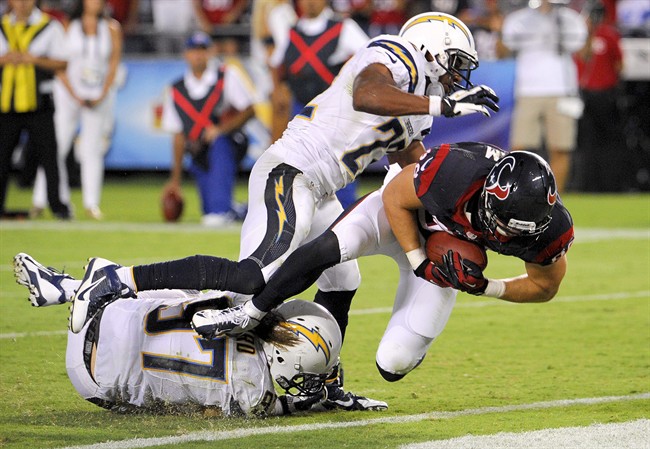TORONTO – Fans of all the perpetual losing sports teams, take a good look in the mirror. Are you eating your feelings after your team lost the night before?

A new French study suggests that when a National Football League team loses a big game on Sunday, its fans end up binge-eating their sorrows, meanwhile fans of the winning team take up healthy eating habits the next day.
The trend was the same when the researchers studied French soccer fans.
“We show that defeats by your favourite football or soccer team make you eat more and less healthy food, especially if they were narrow, unexpected and against an opponent of the same strength,” lead author Dr. Pierre Chandon wrote on his website.
“The flip side is that victories make us eat slightly better.”
Read more: What Canadians want to know about what’s in fast food meals
So how sinful are fans of the losing team? The day after, these supporters tended to consume 16 per cent more saturated fat than usual and even 10 per cent more calories.
Those who lived in the winning city ate nine per cent less saturated fat than normal and five per cent fewer calories.
And if the fans are of the die-hard, paint-your-face, season-ticket-holding, personalized-jersey-making variety, the effects are even more exaggerated: fans of losing teams ate three times more fat (up to 28 per cent more), meanwhile their winning counterparts ate 16 per cent less fat than on an average day.
That happened in at least eight cities with groups of devoted football fans.
Read more: Young Minds: Growing research backing nutrition’s role in mental health
The study was based on 475 NFL games and 30 teams in more than two dozen cities. It focused on fans of their home city’s football team because that was easiest to track. On game day, and the days following it, the study’s subjects were asked to keep food diaries, tracking each meal.
The researchers guess that fans eat more when their favourite team loses because it’s a classic coping mechanism. Winning offers a boost of confidence, though, so fans tend to make better choices, Chandon told the Daily Mail.
Cleveland Clinic’s Dr. Joe Rock says that emotional eating is exactly what’s at play.
“It doesn’t work to fix anything, but at least it makes us feel better for a second. And when we’re feeling uncomfortable, we’re not thinking about what’s going to happen in a month, we’re thinking, ‘I’m feeling crummy today and I want that to change,’” he said.
Read more: Measuring meals by exercise, not calories helps consumers eat healthy: study
Rock says that sports fans need to put together a game plan of their own in case of a loss, especially when the stakes are high.
Try to keep the snacks away from your desk at work, throw out leftovers from the game day party and acknowledge that you’ll be particularly vulnerable around cupcakes and chicken wings, Rock said.
“Just realize that you’re likely to do some things that aren’t going to be great for you tomorrow if your team loses,” he said.
Chandon then tested French soccer fans, asking them about an experience of their favourite team winning or losing.
Afterwards, subjects that wrote about a losing experience reached for the chips and chocolate, meanwhile those who looked back on a winning moment reached for grapes and cherry tomatoes.
Read more: Reading food labels doesn’t equate to healthy eating, Quebec researchers say
Instead of eating your feelings, the study’s researchers suggest the conventional diet tip handed to women – write it down.
“After a defeat, write down what is really important to you in life. In our studies, the simple technique, called ‘self affirmation,’ completely eliminated the effects of defeat,” the researchers told the Daily Telegraph.
It works “even if you are rooting for a perennial loser.” So there’s hope for you, Toronto sports fans.
The study’s findings were published in the journal Psychological Science. Read the full study, “From Fan to Fat?” here.
carmen.chai@globalnews.ca
Follow @Carmen_Chai


Comments